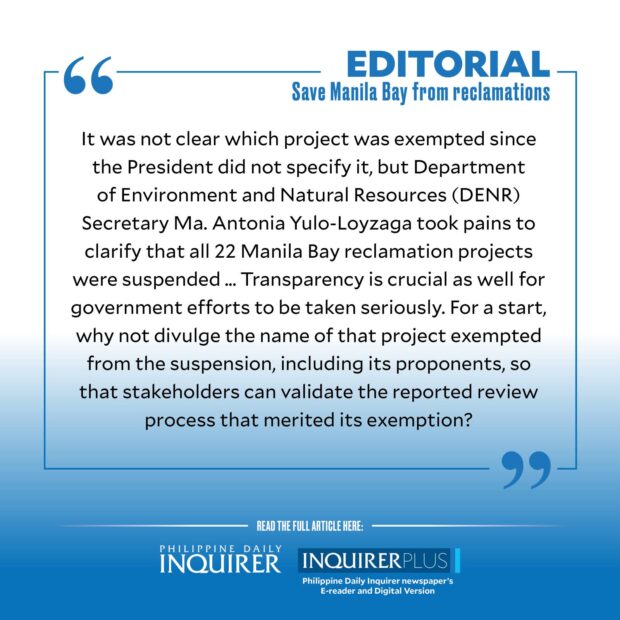Save Manila Bay from reclamations
President Marcos’ decision to suspend almost all reclamation projects at Manila Bay may be long overdue, but it’s a commendable move hailed and welcomed by environmental groups that described it as “a resounding victory for coastal ecosystems and the Filipino people.”
“All reclamation projects are under review. There is only one that will continue because it was already reviewed,” the President said early last week, during a situation briefing on the massive flooding in Bulacan caused by heavy rains from Typhoon “Egay.” “There are a lot of problems. We saw many projects that are not being managed, operated properly,” Mr. Marcos added.
The indefinite suspension comes on the heels of the United States Embassy’s statement expressing concern over the environmental impact of the reclamation projects, and their ties to China Communications Construction Co. (CCCC), which the embassy said has been cited by the World Bank and Asian Development Bank “for engaging in fraudulent business practices.’’ The embassy also noted that CCCC was involved in “helping the Chinese military construct and militarize artificial islands in the South China Sea.”
It was not clear which project was exempted since the President did not specify it, but Department of Environment and Natural Resources (DENR) Secretary Ma. Antonia Yulo-Loyzaga took pains to clarify that all 22 Manila Bay reclamation projects were suspended.
In announcing their suspension, the President himself noted the ill effects of the projects: “[I]f they all push through, many rivers will be clogged, including the ones emptying into [Manila Bay]. The water will have nowhere to go. Even on Roxas Boulevard, the sea will disappear,” he said.
The reclamation projects in Manila Bay are at various stages of development, according to data from the Philippine Reclamation Authority, which former president Rodrigo Duterte had transferred from the DENR to the Office of the President in 2019 through Executive Order No. 74.
Environmental groups have long deplored these projects, citing their destruction of Manila Bay’s ecosystem and the displacement of coastal communities. They’ve repeatedly cited the bay’s crucial role as the center of biodiversity with over eight species of shellfish and 50 species of fish in its waters, while serving as a stopover for migratory birds. With the bay’s coastline stretching across eight provinces in Luzon and three regions, it becomes the natural outlet of several waterways. Blocking it with reclaimed structures can only lead to devastating floods and the resulting loss of crops, several groups have pointed out.
“Creating land where there was once only water brings irreversible destruction to marine habitats and makes us vulnerable to disasters,” the group Oceana said, adding that the dumping and filling of the seas is illegal and violates the people’s constitutional right to a balanced and healthful ecology, while depriving fisherfolk in surrounding communities of their livelihood that would consequently endanger food security.
Previous studies have also cited Manila Bay’s increased vulnerability to environmental hazards because of climate change that is expected to bring increased rainfall, stronger storm surges in coastal areas, and rising sea levels that would result in the rapid sinking of land or subsidence.
The National Mapping and Resource Information Authority on Tuesday noted that sea levels in Manila are rising at thrice the global average: 8.4 millimeters a year compared to 3.4 mm/year global average based on data from 1902 to 2022. A more recent analysis from 1965 shows an even higher average of more than 14.4 mm sea level rise every year.
On top of such ecological risks, US Ambassador MaryKay Carlson last week raised concerns on the damage that reclamation projects could wreak on the cultural and heritage appeal of Roxas Boulevard which lines the bay famous for a glorious view of the sunset. Recall that Manila Bay has witnessed historic battles such as the Battles of La Naval de Manila that ended Dutch attempts to seize the Philippines, the Battle of Manila Bay during the Philippine-American War, and battles during World War II that saw the bay’s fortified islands, like Corregidor, suffer heavy damage.
So what happens next? How long will this “indefinite suspension” last?
Why not a clear, inclusive, and extensive national policy on reclamation then, that would prevent local government officials from making shady and secret lucrative deals with housing and real estate consortiums?
Transparency is crucial as well for government efforts to be taken seriously. For a start, why not divulge the name of that project exempted from the suspension, including its proponents, so that stakeholders can validate the reported review process that merited its exemption?
Otherwise, Yulo-Loyzaga’s vow that the DENR is here “to actually implement environmental laws,” would be mere rhetoric.

















